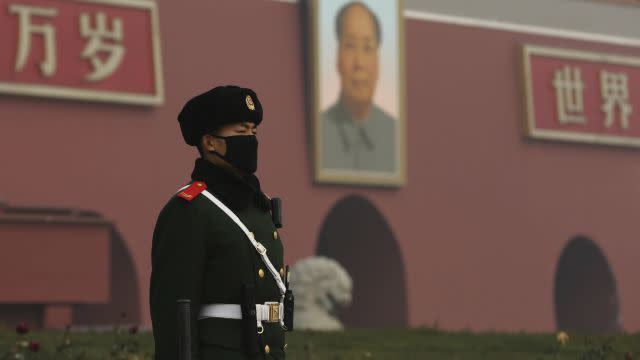Brexit is providing great fodder for China’s communist propaganda machine

Among Brexit’s biggest losers is China. The UK’s pending departure from the EU will cause China to lose one of its strongest allies in the trade bloc. An EU without the UK might be more liable to slapping China with higher tariffs, for starters.
At the first annual meeting yesterday (June 26) of the Asian Infrastructure Investment Bank, China’s answer to the World Bank, Chinese economic policymakers were vocal about their disappointment with the referendum’s results.
“If (Brexit) is an important landmark in terms of a reversal of globalization, I think that’s very bad for the world, it’s very bad for China,” Peking University professor Huang Yiping told Reuters.
Yet while Brexit could be bad news for China’s economy, it’s great news for the propaganda apparatus of the Chinese Communist Party (CCP).
As the country’s economy slows, the government will feel pressure to justify its one-party system to a populace that’s increasingly agitated. Brexit is a gift for China’s propagandists that’s better than anything they could produce on their own—it’s concrete evidence that democratic decision-making can lead to catastrophic results.
China’s economic woes pose a direct threat to the stability of the CCP. Official statistics place the nation’s annual economic growth for the first quarter at 6.7%. But plummeting industrial output, fixed-asset investments, and retail sales indicate that the glory days of endless expansion are numbered. In February, state-owned companies laid off 1.8 million workers in a single round of cuts in the coal and steel industries.
For years the party could point to rocketing economic growth as evidence of its success, and further reason to justify its one-party political system and suppression of civil liberties. Now that growth is slowing, it’s only upping the ante further.
Politically, Chinese president Xi Jinping has streamlined the party’s leadership at all levels, ousting enemies and factions that might oppose his agenda.
Meanwhile, the party has bolstered its propaganda efforts. Bans on news and entertainment critical of the party have increased. Outspoken bloggers, writers, lawyers, and dissidents have been jailed, whereas in the past they would have been quietly tolerated. When China’s stock markets were crashing after a yearlong state-driven push, authorities issued directives telling media not to publish negative coverage.
Brexit is now another tool China’s propagandists have at their disposal in order to justify the one-party state and its suppression of dissenting views.
When asked about Brexit in a diplomatic context, Chinese state officials have given relatively conservative public statements. Hu Chunying, a spokesperson for China’s foreign ministry, delivered a typically distant response to a reporter’s question at a routine press conference on Friday (link in Chinese):
China respects the choice of the English people. China has always viewed the Sino-British and Sino-European relations with a strategic height and long-term angle. We support the road of development that Europe has chosen themselves. We hope the UK and the EU will arrive at an agreement through negotiations as early as possible. A prosperous and stable Europe is in line with the interests of all parties.
But state media, which is often a barometer for how the party at large feels about something, has been quick to hold Brexit up as an example of the pitfalls of democracy. In an op-ed written days before the actual referendum, professor Wang Yiwei of Renmin University of China described the referendum as a “game” that had been “kidnapped by populism” (link in Chinese):
Democracy is supposed to be an achievement in the political civilization of human beings. But now it seems to have become a game that people play around with; this can only be described as a tragedy. The fact that Europe constantly put on these games of “referendum” proves that democracy is being kidnapped by nationalism and populism, and more and more negative impacts are emerging.
Yang Chengxu, who served as a Chinese diplomat to Austria in the late ’80s, cites England’s wealth and education gap as two out of four reasons (link in Chinese) behind the Leave camp’s victory:
Third, this year the wealth disparity in the UK is worsening. For example, north London is home to many billionaires, while residents in the south are worse-off and many houses are dilapidated. Voters in the north often support Remain while voters in the south support Leave, so this leads to further antagonism.
Fourth, when we look at the education system in the UK, only around 7% of their people can receive good education and land a job in a decent sector like in the government after graduation. For those voters who are less educated, many will develop a rebellious mentality and thus become antagonistic.
Yang is not-so-subtly warning readers about democracy. China has some of the world’s worst income inequality. A significant education gap exists, as well, due to the country’s urban-rural class divide and the hukou permit system, which designates social benefits based on one’s status as an urban or rural worker.
The Brexit is not the only example of populism or democracy that China’s propagandists will latch onto in order to justify one-party rule.
Donald Trump has already captivated the attention of Chinese media—state-affiliated weekly Beijing Review called him “a joke” (link in Chinese), gleefully noting how the candidate who captures the hearts of the people is a racist populist. Meanwhile, as Taiwan’s economy continues to falter, the party will almost certainly blame the island’s democratic institutions—particularly under the leadership of Tsai Ing-wen, who does not endorse unification with the mainland—as an example of why China needs one-party rule.

Sign up for the Quartz Daily Brief, our free daily newsletter with the world’s most important and interesting news.
More stories from Quartz:

 Yahoo Finance
Yahoo Finance 